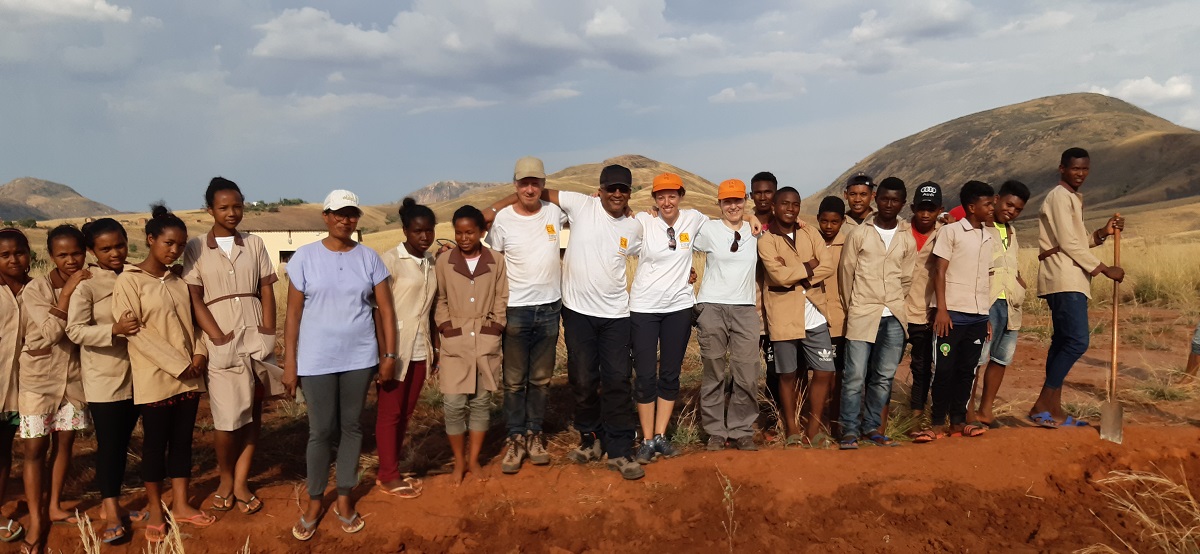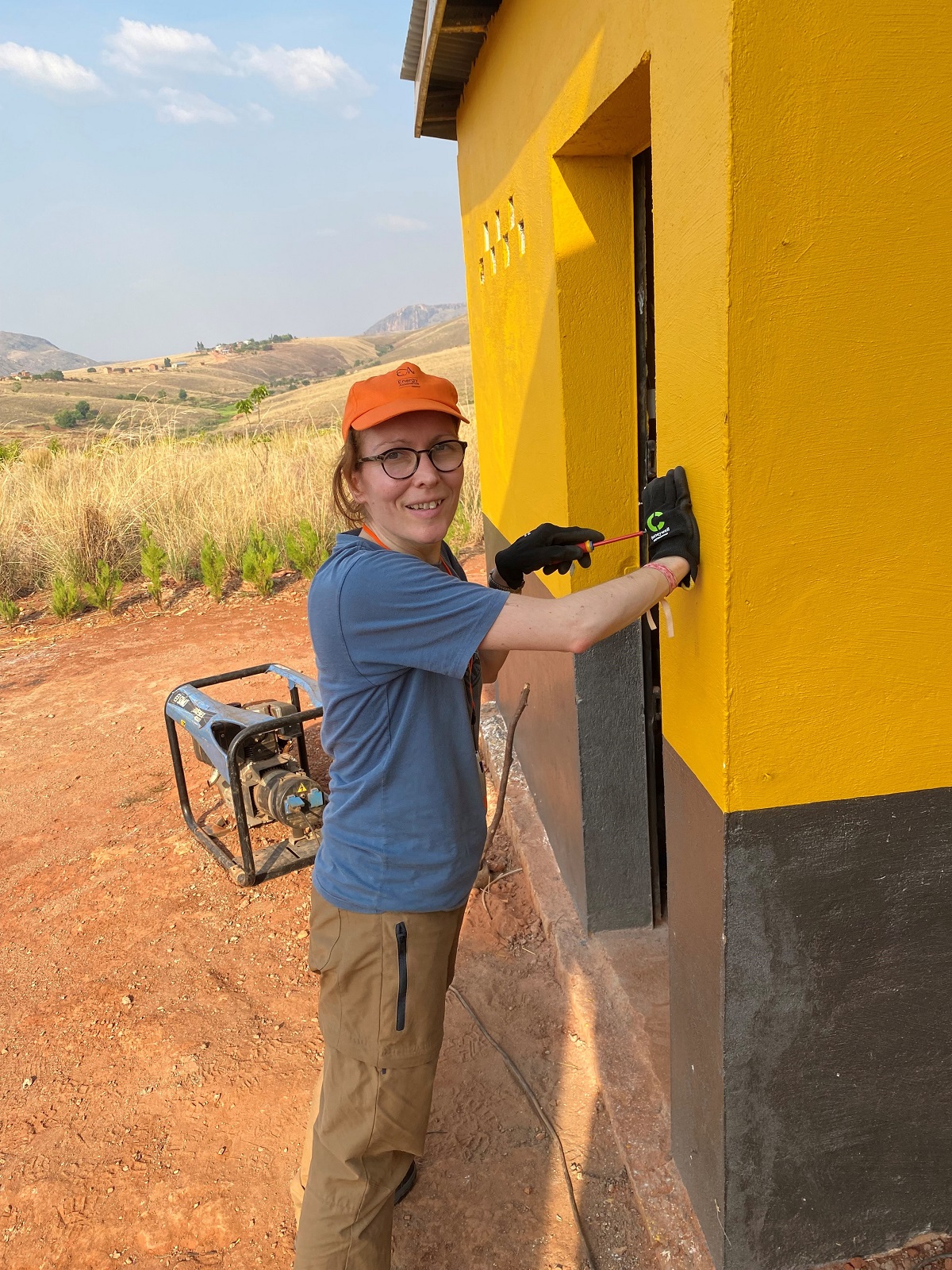


It's something we don't even pay attention to anymore in western countries, but not everyone has that access to energy.
Anne Rotschi has always been an activist for peace and human development. She had a dream of participating in humanitarian projects. She seized a job opportunity at Energy Assistance France to live her commitment on a daily basis.
Anne, tell us about your background, what you do at ENGIE and Energy Assistance France
I am an engineer and I have always worked in the energy sector, at ENGIE since 2001. I took several years off to follow my husband abroad and we went to live in Malaysia. There I had the opportunity to train in coaching, and I accompanied adults in their professional transition. We then left for the United States where I trained in coaching children, who can be accompanied from the age of 6. So I took advantage of my years abroad to train myself in something that is really meaningful for me. When I returned to France, Energy Assistance France was looking for a humanitarian project manager, and I applied. For a little over 2 years, I have been responsible for humanitarian projects related to energy access, projects intended for populations living in very isolated areas, who have little or no access to energy.
My role is to help Energy Assistance France prepare projects and carry out assignments. I support project managers and teams on logistics, administration, studies, partnerships and communication.
What are the links between ENGIE and Energy Assistance France?
Energy Assistance was founded in 2001 in Belgium; then in 2005, the Energy Assistance France association was created, under the 1901 law. It is an NGO backed by ENGIE whose activists are employees or retirees of the Group. We also carry out certain projects in coordination with or for the ENGIE Foundation.
We operate on all continents where the lack of infrastructure weighs heavily on populations living in isolated areas. Access to health, education and economic development are our three areas of action. Before the pandemic, we carried out around twenty missions a year in Southeast Asia, in various African countries, in countries where the security risks are considered moderate, because we are very concerned about the safety of our volunteers.
Are you part of the ENGIE Foundation?
No, we are independent from the Foundation. We are an association with its own office, administrators, and functioning. This does not prevent us from collaborating closely and supporting the Foundation when they have requests for action on access to energy.
There are many ways to change the world. And I think you have adopted several!
I have always been curious about different cultures. When I was very young, I participated in an international camp to build peace where I met people from different countries that I would never have met otherwise.
On the occasion of the World Transplant Games in Nancy, I met people from all over the world who were there for sport, to promote transplantation and organ donation. When I was a student, I got involved in the solidarity association of my engineering school and we took part in various engagements like, the Telethon, the restoration of social housing in the settlements of northern France, solidarity actions with people less privileged. .
I continue this dedication within Energy Assistance France , helping to promote a better life in underdeveloped rural areas and giving a future to children and families in isolated villages.
You just took part in a mission in Madagascar
Within EAF, I usually support the teams and participating in this mission fulfilled one of my childhood dreams. I am used to preparing these missions but experiencing one was overwhelming. It's hard physically because we're on a construction site. For me, who has always worked in offices and never been on a construction site , it was a first shock!
But even more, I felt a culture shock by discovering the reality of the people we met there, by feeling their simplicity and their happiness despite their living conditions.
We left for Madagascar in November 2021 in order to electrify a high school in the bush and a grocery store. Thanks to solar, the grocery store will allow economic development by operating a fridge and offering the possibility of charging telephones.
As for the school, which has a boarding school, parents were more and more reluctant to enroll their children because of the lack of electricity. And even more, the students will now be able to do practical work related to computers which are in the final year program and which were impossible due to lack of electricity. They will thus have as many chances as high school students in the cities and maybe get as good results.
Similarly, to work in the evening, to do their homework, they used candles or kerosene lamps, but this is potentially dangerous, and exposes them to air pollution.
For the teachers, we have installed solar kits with a lamp and small panels on the staff accommodation, which allow them to charge a telephone and have light. It's something we don't even pay attention to anymore in western countries, but not everyone has that access to energy. For us, it is very important to allow access to education and It was really moving to see the immediate impact of our actions.
Concretely, what did you do during this mission?
The mission consisted of 4 people: a retired and experienced mission leader who also knows the technique very well, a technician specializing in electrical distribution, a solar project manager who had already led a mission and myself.
We were away 12 days because you had to take into account the mandatory PCR tests on arrival and departure. Then we had a 6 hours journey, 3 hours on the road and 3 hours on the track, to get to the intervention zone, inland to the west of the capital.
Our first task was to inventory the material we had received. Indeed, we purchased the equipment locally and had it delivered in advance, but the inventory always leads to surprises. We assessed what we could do with what we had and found solutions.
We started with electrifying the high school, deciding the location of the trenches to connect the technical room, the high school, the dormitory, the toilets. We had local help digging the trenches, and luckily it had rained the night before which helped loosen the ground.
We worked in pairs. A pair took care of preparing the mounting rails for the solar panels and fixing the solar panels on the roof. The other pair was in charge of installing the plant in the technical room, starting the electrical distribution, installing the sockets, the switches, the lights.
It's a job that I had never done, and I really liked learning how to pull cables, from point A to point B. It is a team effort, and it was a beautiful moment with the EAF team and the beneficiaries.
Then, we installed the distribution cables- passing if possible through the attic-then connected the LED tubes in the three classrooms. We haven't been idle! We managed to do all this in 3 days: we had a scare when the converter went into alarm on the first test. Fortunately, with the advice of the supplier everything worked well the next morning!
We were able to move on to the grocery store. Everything worked well there too. We installed 2 solar panels on the roof of a small room of 6 m². I realized that in a few days I had really improved my skills, and we finished the grocery store very quickly. Then, we had time to take photos to document the mission before leaving.
We were lucky to have good weather conditions, nobody got sick, everything went according to plan.
A message you would like to share?
There are two things that I often think about, and which have certainly guided my choices as a wife, in my career and as a mother.
If the world today is still dominated by men, maybe it’s because women lack benevolence towards one another. If they became aware of the energy that is lost in comparing themselves, in being unkind, in judging too quickly, if they put this energy into more constructive things, perhaps women would take the places that they should have in civil society and in business.
The other thing is my role as an example, especially for my daughter. What image do my life choices give to my daughter? If I step back, if I don't take matters into my own hands, if I don't defend my rights, if I don't take initiative, don't take risks, what does that say to my daughter?
If I don't achieve something I care about because I'm afraid, what example am I?
As a coach, I have to lead by example and Inspire others, especially little girls. This thought boosts me, helps me to persist.
And would you leave tomorrow for another mission?
Maybe not tomorrow, I still need a little time to think about it all. But yes, definitely, as soon as I have the opportunity in the months or years to come, I really want to go back on a mission.